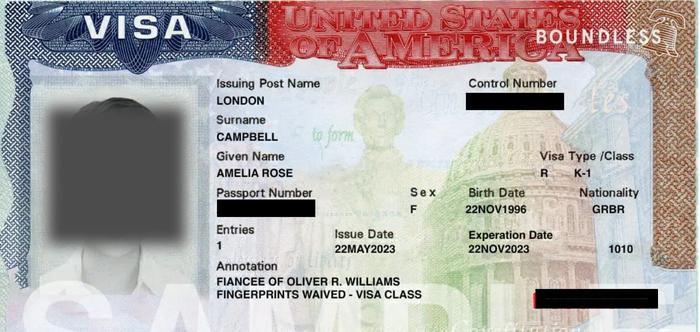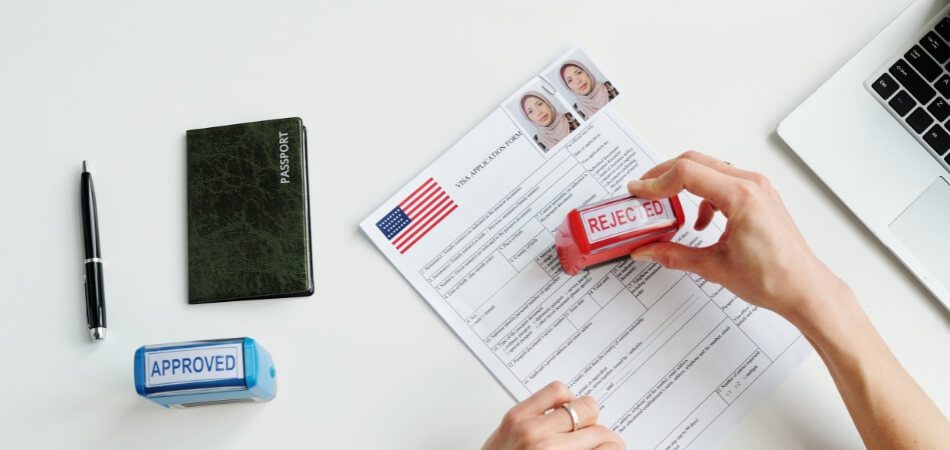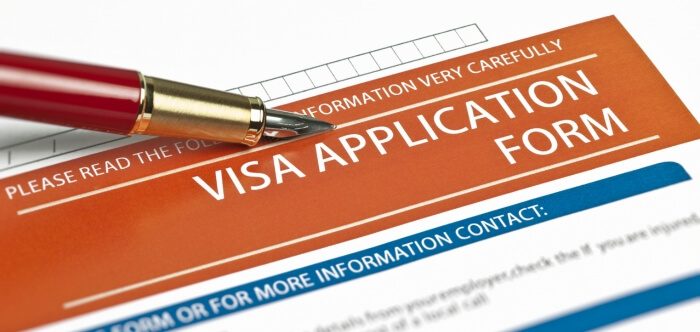It can be difficult to figure out the world of foreign travel, particularly when it comes to knowing what kind of visa you need. You’re not the only one who has ever questioned why some applications for US visiting visas are turned down. US Visitor Visa Refusal Reasons is one of the most commonly asked inquiries in this area.
Insufficient ties to the home nation, poor financial support, incomplete documentation, and suspicion of immigration intent are common grounds for US visiting visa refusals. It’s crucial to address these factors when applying to increase your chances of approval.
Dive deeper into this article to grasp the nuances of these refusal reasons. By comprehending and addressing these concerns, you stand a better chance of making your next US visitor visa application a successful one. Let’s explore these factors together.
What is the Visitor Visa?
A visitor visa, often referred to as a tourist visa, is an official document that allows its holder to enter and stay in a foreign country for a limited period. This type of visa is typically sought by people wishing to vacation, visit family or friends, or attend short-term events. While the exact requirements and duration vary from one country to another, the primary purpose remains: to grant temporary access to tourists and short-term visitors.
In the process of obtaining this visa, applicants usually need to prove they don’t intend to overstay or seek employment. This often involves showcasing financial stability, confirmed travel plans, or compelling reasons to return to their home country. Moreover, some nations might demand medical examinations or proof of vaccination, especially in today’s health-conscious global scenario.
However, it’s crucial to remember that a granted visitor visa doesn’t guarantee entry. On arrival, immigration officers assess visitors and their intentions. They possess the authority to deny entry if they suspect any discrepancies or misrepresentations in the application or the visitor’s stated purpose. Thus, it’s always wise to be genuine, well-prepared and informed about the visa’s terms and conditions.
Importance of US visitor visas
The United States is a top tourist destination with diverse landscapes and a rich culture. US visitor visas make traveling for business, vacations, or family reunions easier. Let’s explore why these visas are important.
Gateway to Exploration
The US is vast, with each state offering unique experiences and attractions. A visitor visa provides a ticket to explore these myriad wonders. From sunny Californian beaches to New York’s bustling streets, the opportunities are endless.
Facilitating Business Opportunities
Business conference, meetings, and seminars frequently occur in the US. A visitor visa ensures professionals can attend these events, paving the way for global partnerships and collaborations. It acts as a bridge for global business networking.
Reuniting Families
Many families are scattered across different countries, with loved ones residing in the US. Visitor visas allow these separated family members to reunite, even if it’s for a short duration. It’s more than a document; it’s an emotion.
Access to World-class Medical Care
The US boasts some of the world’s leading medical institutions. People from around the globe seek specialized treatments available here. A visitor visa grants access to these top-notch healthcare services, potentially saving lives.
Cultural Exchange and Learning
Travelers often desire to immerse themselves in a new culture, and the US offers a melting pot of traditions. The visa lets tourists experience American life firsthand, fostering mutual understanding and global connections.
The US visitor visa serves as a key that unlocks a plethora of experiences and opportunities. Whether it’s for leisure, work, or health, its significance in building bridges between the US and the rest of the world cannot be overstated.
Us Visitor Visa Refusal Reasons
The journey to acquiring a US visitor visa can sometimes hit unexpected roadblocks. While many sail through the process smoothly, others find themselves facing refusals. Diving into the US visitor visa refusal reasons can offer clarity to hopeful applicants, ensuring better preparedness for future applications.
Lack of Ties to Home Country
One primary reason for visa refusal is insufficient ties to one’s homeland. The applicant might not have shown compelling reasons to return, such as a stable job or family. Establishing these connections is crucial to assuage concerns of potential overstays.
Incomplete or Incorrect Documentation
Documentation is pivotal in visa applications. Any missing, outdated, or incorrect papers can lead to an immediate rejection. Applicants must meticulously ensure that every required document is in order, current, and valid.
Insufficient Financial Proof
The ability to support oneself during the US visit is paramount. If an applicant fails to showcase adequate funds, the visa might be denied. Proof of financial stability, like bank statements, can make a difference in the application’s outcome.
Prior Immigration Violations
Past issues with any country’s immigration can be a red flag. If an individual has overstayed or violated visa terms previously, it can lead to refusal. Being transparent about past mistakes and showing corrective measures can help in future applications.
Misrepresentation or Fraud
Honesty is the best policy, especially in visa applications. Providing false information or faking documents can lead to not just visa denial but more severe consequences. It’s always advisable to be genuine and transparent throughout the process.
Exploring the factors leading to visa denials is crucial for travelers. Each situation is distinct, but awareness and vigilance boost your visa approval odds.
How to Avoid US Visa Refusals?
It might be difficult to deal with the complexity of the US visa application process, but rejections can be prevented with careful planning and knowledge. Here’s a step-by-step guide to boost your chances of securing a US visa.
Step-1. Understand Visa Requirements Thoroughly
Begin by acquainting yourself with all visa prerequisites for your specific category. The US embassy or consulate websites offer comprehensive checklists. Familiarizing yourself with these reduces the chance of overlooking crucial details.
Step-2. Compile a Complete Application
An incomplete application is an open invitation to refusal. Ensure you fill out all forms accurately, without leaving any section blank. Attach all required documentation, ensuring clarity and validity.
Step-3. Strengthen Ties to Your Home Country
Demonstrate concrete reasons to return home post-visit. This can include proof of employment, property ownership, or familial obligations. The more ties you showcase, the less likely you’ll appear as an overstay risk.
Step-4. Maintain Clear Financial Records
Present clear evidence of your financial capability to support your US trip. This includes bank statements, payslips, or tax returns. Clearly labeled and recent financial documents can be convincing.
Step-5. Be Honest and Consistent
It’s essential to be consistent in your application and interview. Any discrepancies can raise red flags. Honesty, even about past mistakes, can sometimes be viewed more favorably than inconsistencies or omissions.
Step-6. Prepare for the Interview
Treat the visa interview seriously. Research potential questions, dress appropriately, and arrive early. Your demeanor, clarity in responses, and presentation can significantly impact the outcome.
Step-7. Seek Expert Advice
If you’re unsure about any aspect, consider consulting with an immigration attorney or expert. Their guidance can clarify doubts, ensure your application’s accuracy, and improve your overall chances of approval.
By adhering to these steps and demonstrating genuine intent, prospective visitors can improve their odds of receiving a US visa. Remember, clarity, honesty, and preparation are your best allies in this journey.
Conclusion
To ensure a smoother travel experience, it’s crucial to grasp the intricacies of the US visa application process. Our exploration of “Us Visitor Visa Refusal Reasons” provides invaluable insights. We’ve highlighted common pitfalls like insufficient ties to your home country, incomplete documentation, and financial stability issues. Armed with this knowledge, you can boost your chances of securing the coveted US visitor visa.
But our assistance goes beyond that. In our guide, how to avoid US visa refusals, we’ve clarified it into easy-to-follow steps. From fully understanding visa requirements to maintaining honesty and consistency throughout the process, these user-friendly tips can significantly enhance your prospects of obtaining that visa stamp.
Remember, obtaining a US visitor visa is attainable, and with the right approach, you can navigate around potential obstacles. Your journey to explore the wonders of the United States begins with understanding these factors and following the practical advice we’ve shared.








